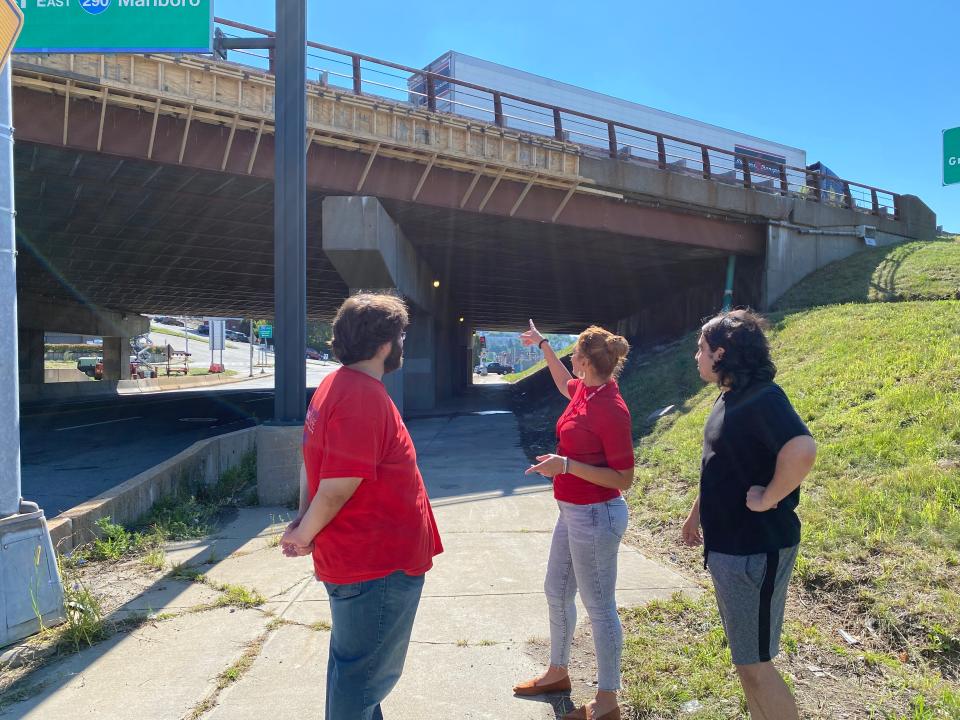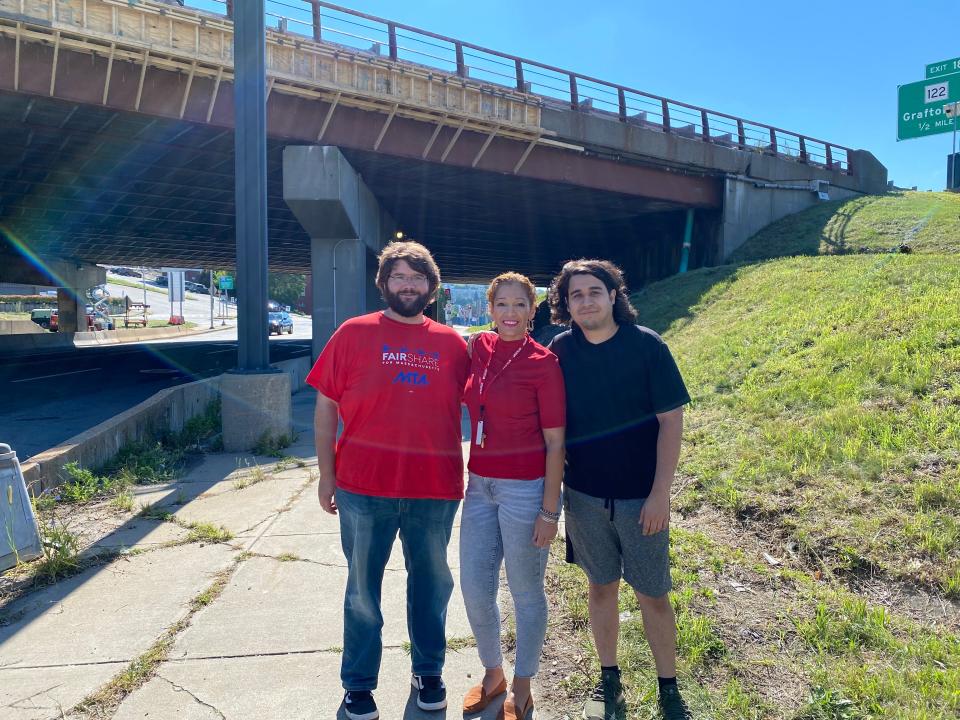With 7 structurally deficient bridges in city, groups push for passage of Question 1
WORCESTER — Just up the street from the Joseph D. Early Post Office on East Central Street, passersby will see a concrete form made of wood stretching alongside the I-290 overpass that crosses over the four-lane road — a signal of the ongoing repair work on the structurally deficient bridge.
It was from this location that supporters of Question 1 — the Fair Share Amendment that will appear on the ballot this November — stood and called for people to vote in favor of the amendment, which could potentially divert money derived from taxes to help repair bridges and other infrastructure, as well as fund public schools.
"This is the most important piece of legislation of my lifetime," Nelly Medina, a Massachusetts Teachers Association worker and Fair Share Amendment Campaign organizer said. "As a mother, whose child will inherit the city, the future, it's important to me to do all I can and do my part to inform people about this legislation to work with the organizers on the ground and the MTA to get this legislation passed."

A total of 102 bridges, out of the 1,493 found in the Central Massachusetts region, were found to be structurally deficient in a report published by the Massachusetts Budget & Policy Center that was released Wednesday.
Seven structurally-deficient bridges in city
In the city of Worcester, seven of the bridges met this definition. The database is viewable on the MassDOT website:
I-290 bridge over East Central Street that travels both directions (two bridges)
Harrison Street Bridge that crosses I-290 (one bridge)
West Boylston Street Bridge that crosses over the railroad and Neponset Street (two bridges)
June Street bridge that passes over that Tatnuck Brook (one bridge)
Route 122 bridge that passes over Southwest Cutoff (one bridge)
The report said that the average Massachusetts resident lives approximately 1.7 miles from a structurally-deficient bridge, that residents "classified as a racial or ethnic 'minority' " live an average 1.3 miles from a structurally-deficient bridge, and that, on average, a household with limited English-speaking abilities lives about 1.2 miles from such bridges.
It also found that about 11% of vehicles crossing the nearly 8,000 bridges in the state are over these structurally-deficient bridges.
The report, which looked at the 644 structurally-deficient bridges listed in a Massachusetts Department of Transportation database from June 2020, found that one in every 12 bridges in the commonwealth had at least one major component that had serious problems and was in need of repair or replacement.
On Wednesday, Medina was joined by Brian Mulhearn, the North Central Massachusetts regional field organizer for the Fair Share Amendment Campaign and Andy Saltzberg, the Black, Indigenous, and People of Color — better known as BIPOC — organizer for the advocacy group at the I-290 bridge.
With the bridge in the background, Medina, as well as other advocates throughout the commonwealth hoping to pass the amendment spoke of the deteriorating bridges and roads in their communities.

When her turn came, Medina discussed the condition of the I-290 bridge, as well as the other roads and bridges throughout the region that create unsafe conditions for people traveling in the city, not only by car, but walking and biking as well.
"I worry about the infrastructure crumbling down on cars ... It's really uninhabitable for people to just walk," Medina said. "Riding bikes is a really big problem … The potholes are a really big problem when we're transporting children to and from school and we need our bridges."
Medina said that, if passed, bridges, roads, as well as infrastructure issues like potholes and bike lanes could be repaired.
Question 1 would add estimated $1.3B to annual state revenue
Currently, a flat income tax rate structure is enshrined in the state constitution. Question 1, if passed, would amend the Massachusetts Constitution by adding a 4% surtax on annual household income above $1 million.
The first $1 million of household income would still be taxed at the current 5% tax rate, and household income above the first $1 million would be taxed at an effective rate of 9%.
A report published this year by the Center for State Policy Analysis at Tufts University said that an estimated $1.3 billion would be added in annual revenue for the state.
While the amendment is intended to shift revenue towards transportation and education, the decision is ultimately left up to the Legislature that is in charge of making decisions regarding state spending.
This could mean that the money created by the surtax could potentially supplant existing state funding for transportation and education.
Coalition: Question 1 'deceptive'
This is a sticking point for the Coalition to Stop the Tax Hike Amendment that said on its website Question 1 is "deceptive."
"The ballot question's text plainly states that its funds are 'subject to appropriation.' And make no mistake — this language was intentional," the group said. "In 2019, Beacon Hill politicians rejected two amendments that would have required the new tax revenues to be used to increase funding for education and transportation."
The group alleges that that language of the amendment would allow politicians to legally use the appropriations process to, "divert existing dollars away from education and transportation — and use them instead for pet projects — while funding for education and transportation could remain the same or even decrease."
The group also alleges that the Fair Share Amendment would be harmful for homeowners, small businesses and retirees.
Mulhearn: Taxing small portion of wealthy 'appealing'
But for Mulhearn, the fact that only a small portion of wealthy people would be taxed is "very appealing."
"We can do so much more for our communities, but we haven't been and that motivated me," he said. "We pride ourselves on having world-class education … being a very well-governed state — and to some extent that is just fine — but there's so much more we could do."
Mulhearn, who began as a canvasser before being hired full time onto the campaign, said that the "small number of folks" who will be paying are "doing very well" with an income in excess of $1 million and would benefit from the amendment.
"If you're doing well, you benefit from having a community with safe bridges," he said. "You benefit from having a community where you don't have to wonder how your employees are going to get to work. You benefit from having a better-educated workforce."
Paying fair share
Saltzberg, who uses they, them and their pronouns, said they are pushing for the passage of Question 1 because, "we're paying a higher (tax) percentage than millionaires right now, so we want to even that playing field.
"Being here so long, I see the inequity here … I just want millionaires to be paying their fair share," they said. "I think especially about funding in underserved communities, and the BIPOC community, and I think about what their fair share could do."
Saltzberg said that the amendment would not only Improve the bridges and roads, as well as the potholes that ravage them, but would also divert some money to public schools, which, they said, Worcester Public Schools could use.
"Teachers are not being paid enough. We don't have enough teachers," Saltzberg said. "There's a campaign right now for paraprofessionals … for higher wages and also for dignity, so I would really like paraprofessionals to make more wages from this."
The money could also be used to help improve school buildings including providing money to install HVAC systems, Medina said.
"Our schools are outdated. Our buildings are crumbling. The sewer systems underneath them are not sustainable," she said.
While Question 1 faces opposition, such as from groups like the Coalition to Stop the Tax Hike Amendment, it has also received endorsement from about 80 labor unions in the state.
This includes the American Postal Workers Union, Central Massachusetts AFL-CIO Central Labor Council, Harvard Teachers Association, Massachusetts Teachers Association, Massachusetts Nurses Association and Mendon-Upton Regional Teachers Association.
The Educational Association of Worcester — the regional educator's union — signed a Fair Share Resolution to signal their support of the amendment being passed. The Worcester School Committee voted in April of this year to also support the resolution.
"The Fair Share Amendment would bring much needed financial resources into our school systems," said Melissa Verdier. "We would absolutely support that in order to provide our students with the best resources possible."
This article originally appeared on Telegram & Gazette: With 7 structurally-deficient bridges in city, groups push for passage of Question 1

